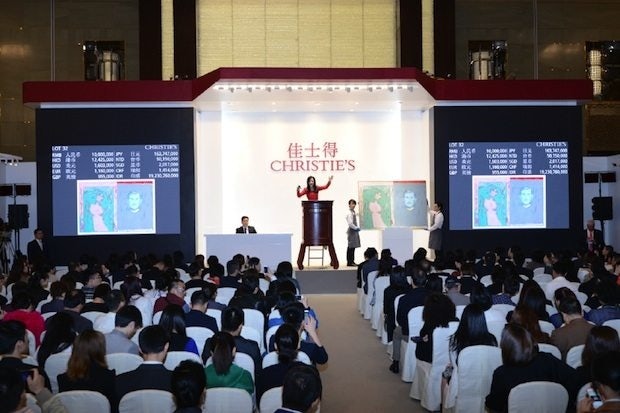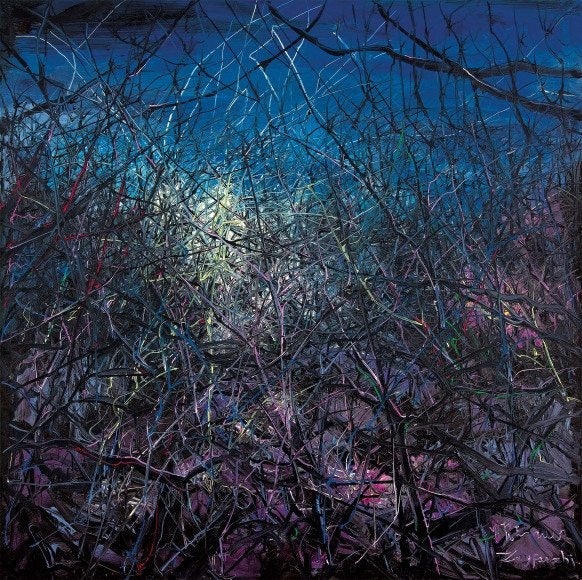
Christie's sale of 20th century Asian and Western contemporary art on April 26, 2014 in Shanghai. (Christie's)
Christie’s efforts to tap into mainland China’s massive and rapidly growing auction market continued this past weekend with its second-ever mainland China sale, which saw a lift from both a strong presence of mainland Chinese collectors and new tax-exempt policies.
The auction house’s April 26 Shanghai sale of 20th century Asian and Western contemporary art was a small affair, netting 125 million yuan ($20 million). This amount was similar to the intake at Christie’s first mainland sale in September, which brought in $25 million and featured both art and luxury items. With 92 percent of all items sold by lot and 93 percent by value, the auction demonstrated that Christie’s is off to a strong start in mainland China as Chinese collector interest grows. “The result of our spring auction in Shanghai is a proof of concept for Christie's China and globally,” said Christie’s China President Cai Jinqing.
With 63 percent of successful buyers hailing from the mainland, the auction showcased significant mainland collector interest in both Chinese contemporary and Western art. Andy Warhol’s “Self-Portrait with Skeleton Arm and Madonna” after Edvard Munch dominated the lots of the evening with a sale of $1.9 million, and was followed by Picasso’s Tȇte de femme, which sold for $1.7 million. Chinese contemporary art had a strong showing as well: Chinese-French artist Zao Wou-ki’s 31.08.2001-09.09.2002 brought in the third-highest amount of the night with a sale for $1.6 million, while Zeng Fanzhi’s Untitled 07-5 netted $1.3 million.

Zeng Fanzhi’s Untitled 07-5. (Christie's)
Pragmatic, investment-minded Chinese art collectors have been a major force in the growth of China’s auction market in recent years, which prompted both Christie’s and competitor Sotheby’s to hold inaugural mainland auctions last year.
New opportunities for art collectors to avoid taxes in both Shanghai and Beijing have also encouraged these global companies to move in on the mainland market. At Christie’s Shanghai auction, lots from overseas sellers were sold under “bond,” meaning buyers are able to avoid customs duties and taxes if the works are not kept in China. Sotheby’s also took advantage of this system at its Beijing auction of modern and Chinese contemporary art on December 1, selling eight “bonded” items (however, tax isn't a major deterrent for collectors—most items sold were not bonded). Christie’s also plans to take advantage of the new Shanghai free-trade zone that opened last year to import more artwork into the country, while Sotheby’s has chosen Beijing for its auctions in part because of the new tax-exempt “Beijing Freeport of Culture” complex.
While these international auction houses are still just testing the waters with their mainland auctions, both have seen positive response so far. Sotheby’s Beijing auction of modern and Chinese contemporary art on December 1 last year netted total sales of $37 million. This was only a fraction of the hundreds of millions that the auction house’s Hong Kong Chinese contemporary art sales bring in, but enthusiasm was high with six artist records set. Meanwhile, Christie’s inaugural Shanghai sale sold 98 percent of its items by lot and 96 percent by value.
For now, Christie’s and Sotheby’s have each carved out their own respective niche in Shanghai and Beijing. Both cities' tax-exempt zones aim to create competition for Hong Kong, which currently reigns as China's top auction center. This means the two cities will be competing with one another as well. Sotheby's may see Beijing as a source for China growth for now, but if the Shanghai free-trade zone takes off in making the city a true global financial center, it's possible that the auction house may be following Christie's lead to compete in Shanghai in the future.